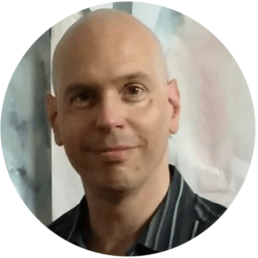Professional Development Workshop
Month: January 2022
Opportunities
Email : info@hornreview.org
Horn Review is hosting a resume and cover letter building workshop designed to help young professionals and students in institutions of higher learning who are exploring the job market. This one-day intensive training will aid young professionals put their best foot forward in their preparations to join the labor force.
Interested in applying?
Send a copy of your university transcript (or proof of current enrollment) along with a one page motivation letter to info@hornreview.org
When : Saturday, Feb 12, 2022
The deadline for application is Monday, February 7
Where : Location details will be announced to finalists.
Share
It’s Time for an African People’s Tribunal: It’s Time for Ethiopia to Put the U.S., the UN, and the TPLF On Trial.
Month: January 2022
Jeff Pearce
Historian, novelist
Twitter : @jeffpropulsion
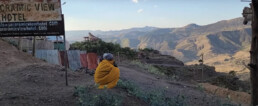
A few days ago, I stood in what felt like the frozen still image of a cyclone, the appalling destruction that TPLF marauders committed on the police station and on the administration offices of Lalibela. You can see it for yourself in the shots taken by photojournalist Jemal Countess, who traveled there with me, and in my own video report. At the time, a very angry police officer told one of our team, “I blame America for this!”
And he wasn’t wrong. It is incredibly condescending at this point to believe that ordinary Ethiopians would be taken in by a “propaganda campaign” on the part of the Abiy government or by #NoMore activists who criticize the Biden administration and the UN for its shameless backing of the TPLF. And it’s quite revealing that those on the other side are quick to marginalize a growing Pan-African movement, trying to smear it as a put-up job by the government. Trust me, Ethiopians can make up their own minds just fine, and their animosity towards Western authorities, Western media, and Western arrogance has its own real foundation.
But where can they air their grievances aside from their own media at home? There have been a few recent cracks in the monolithic wall, but by and large, TV networks and papers in the U.S. and Europe shut them out and rely on the same old apologists for the TPLF, such as Alex de Waal, Martin Plaut, William Davison and others.
Even as the TPLF scurries back to its regional enclave, blatantly lying about its military reversals and claiming that it wants to give peace a chance, its propaganda machine still pushes the Tigray Genocide narrative, despite it being debunked by the joint investigation of the Office of the U.N. High Commissioner for Human Rights and the Ethiopian Human Rights Commission. Have to give the terrorist group its props, its lobbyist has relentlessly pushed the most sinister, downright evil items to try to hobble a democratic African government.
The TPLF have been desperate to get Abiy in the dock at the International Criminal Court for some time, its thugs even barging into UN offices to try to get the names of sexual assault victims and the locations of safe houses, as I first reported months ago. It is not enough for them to have virtually the entire Western media in its pocket, it desperately wants this stamp of validation from The Hague.
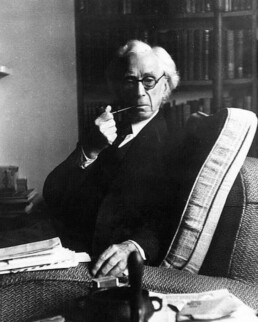
So maybe it’s about time pro-Ethiopia activists flipped the table — and got their own tribunal. Let me explain what I mean, as I am not talking about a judicial process through the Ethiopian state and its courts. That time will come, and that process needs its day. No, I want to borrow a different idea.
For those who have never heard of Bertrand Russell, he was a tweedy, softspoken but fiercely intelligent activist and philosopher who was still plunking himself down on air-cushions for sit-in protests in Trafalgar Square when he was in his nineties. And in 1967, he organized what came to be known as the “Russell Tribunals” — a kind of activist “do it yourself” set of panels that judged whether the U.S. had committed war crimes during the Vietnam War (spoiler alert; did they ever).
The tribunals had no legal authority or power. They were, when you get down to it, a very elaborate PR stunt to change the dominant thinking over Vietnam, and the spotlight for them relied heavily on the reputations of their distinguished members, which included among others Jean-Paul Sartre, Simone de Beauvoir, Tariq Ali, James Baldwin, Alice Walker and Stokely Carmichael. But they made a difference.
As Cody Foster put it in a 2017 article looking back on the initiative, “The tribunal and the marches did not bring the war to a close, but they helped energize international opposition to colonialism and imperialism.” In Russell’s mind, “the people — properly organized and motivated — could hold governments in check. It was an urgent idea in 1967; it remains one today.”
Indeed, it does. Especially when as a friend of mine, an Ethiopian journalist, reminded me only yesterday, Africa is being coerced relentlessly to accept the Western world’s version of justice.
But why should it? As I’ve asked many times, why should Ethiopia or the rest of Africa automatically genuflect and defer to those who appoint themselves the arbiters of morality from their comfortable perches in America and Europe?
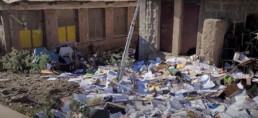
It’s time for an African People’s Tribunal. A tribunal in which Ethiopian voices
are properly heard. One with seats for eminent African figures in law, literature, Pan-African activism, science, economics, etc.
Like the Vietnam tribunals of decades ago, it would lay out the case against the TPLF, as well as U.S., UN and EU complicity in helping a terrorist group destabilize a nation in the Horn of Africa — one which marked one of the freest and most open democratic elections in the continent’s history.
You can rest assured there will be no shortage of evidence. From the scores of soldier witnesses who endured the attacks on the five Northern Command
outposts to the survivors of the Mai Kadra Massacre to the evidence emerging of at least 32 women raped at Ayna Eyesus and the vengeful destruction in Lalibela, Dessie and so many other locales, there will be much to keep the tribunal busy.
I personally believe we need such a tribunal — and soon. In a brilliant article written by Bronwyn Bruton and Ann Fitz-Gerald, the case is made for TPLF leaders who planned and initiated the war to give themselves up, while suggesting that Ethiopia’s Prime Minister Abiy “declare amnesty for the TPLF rank and file who were coerced into fighting…”
This idea needs strong support in public forums, and if it can get some traction, it would encourage those same rank and file to step forward as tribunal witnesses.
The West needs to finally comprehend that most Tigrayans were not victims of the Ethiopian government in this conflict, but of the TPLF, who didn’t hesitate to extort and threaten them to give up their meager supplies of food and to turn over their children to fight.
The West needs to finally comprehend that most Tigrayans were not victims of the Ethiopian government in this conflict, but of the TPLF, who didn’t hesitate to extort and threaten them to give up their meager supplies of food and to turn over their children to fight.
Who would organize these tribunals? Who would run them? And where? My suggestion would be to hand this idea off to the good folks in the #NoMore movement, but it needn’t be dumped on the plate of the top organizers in America. Like Black Lives Matter, #NoMore seems to be mushrooming and evolving into a loose franchise network, allowing other activists around the globe to bring what they have to the table. This is smart — and it means a Pan-African renaissance can flourish and grow according to its needs.
So, how about it, African activists? Do you want to take this ball and run with it? Find the writers, statesmen and stateswomen, and great thinkers on the continent who would be willing to be members?
I can assure you that once you do, there will be a long line of reporters, photographers, witnesses, and survivors queuing up to present the evidence.
As for where to hold the hearings… One spot could be Nairobi, a choice that has a certain dark humor irony to it since so many major news outlets still think they can get away with filing stories on Ethiopia from there. Will the Western media want to cover the tribunals? Of course not!
You can practically draft in your head the passive-aggressive dismissal that the Great Fungus of Crisis Group, William Davison, will come out with when he festers anew on BBC. Or TRT. Or France 24. This is a guy who doesn’t think twice about trying to smear #NoMore as a shill for the Abiy government.
So no, don’t expect to see any CNN cameras or Cara Anna of Associated Press showing up to cover the African People’s Tribunal if it comes into being. And that’s just fine.
Instead, the tribunals’ organizers should look to RT, sympathetic Turkish media, more receptive media outlets in Europe, South America, and Far East Asia who will do a proper or at least reasonable job of covering the presentation of evidence.
If the various foreign policy debacles of the United States in the last 60 years have taught us anything, it is that — like the colonial empire of Britain — it can only endure so much shame and so much loss of prestige.
The U.S. government is happy to get into bed with truly evil people — but it doesn’t like others knowing about it.
As someone who now has to accept that he’s become an activist, I think we’ve wasted far too much time chasing attention on Western media outlets, which we hope in turn will lead to a sympathetic hearing in the corridors of power in Washington, London, Brussels, Ottawa and elsewhere.
As someone who now has to accept that he’s become an activist, I think we’ve wasted far too much time chasing attention on Western media outlets, which we hope in turn will lead to a sympathetic hearing in the corridors of power in Washington, London, Brussels, Ottawa and elsewhere. Folks, it might never happen… or if it does happen it might be too late.
I would rather leverage other media against those news outlets who have proven again and again that they are openly hostile against the truth.
All this time, we’ve been forum shopping along the same strip of real estate. We
can go elsewhere and do better.
And I can tell you after writing professionally for 40 years — a reasonable chunk of them for national magazines, newspapers at home and abroad, and network television — that nothing angers the major media brands like being shut out of a story (case in point, the Grand Dame of Entitlement herself, Nima Elbagir, clearly fuming that she can’t stroll back into Ethiopia after repeatedly labeling a country).
The big media outlets will react poorly if they can’t push their way in while day passes to the tribunal hearings are given to this or that Brazilian newspaper or to China’s CCTV.
When finally let into the hearings, they may still attempt their corrosive spin, but they’ll be outnumbered and contradicted by the rest of the world’s media, which — with luck — will build new momentum.
Half of this tragic conflict has been spent on the battlefield of public opinion in the West, trying to convince certain powers that be they should stop supporting a group of homicidal psychopaths. And part of that mission has always been to gain renewed respect for African voices.
But that respect won’t come until those voices are amplified, until the mechanisms for helping to decide world opinion are in African hands. And one of those mechanisms can be created now if there are activists ready to act on this vision and bring it to life.
But that respect won’t come until those voices are amplified, until the mechanisms for helping to decide world opinion are in African hands. And one of those mechanisms can be created now if there are activists ready to act on this vision and bring it to life.
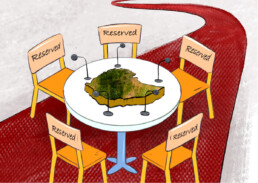
Share
My Dam, My Why, My Dignity
Month: January 2022
Mekdelawit Messay
PhD Candidate
Florida International University
Twitter : @Mekdi_Messay
Why does Africa’s forerunner project, the Grand Ethiopian Renaissance Dam (GERD) inspire, motivate and enamor its supporters so much? What is it about the GERD that resonates with us, moves us so deeply that we give from the little that we have, stand by it with our heads held high in the face of fierce powers, and show it a loyalty so deep it even inspires others to stand with us? In his book called Start With Why Simon Sinek says, “people don’t buy what you do, they buy why you do it.” He argues that starting with the “why” of doing things, then moving on to “how” and then to “what” makes for lasting successful endeavors. He calls this approach “the golden circle.” Sinek’s book is written in the context of business and how people who lead with “why” can inspire others, but this core principle of starting with “why” can also be extended to all aspects of life.
I have found striking parallels and application of this principle in the case of the GERD; in the unrelenting will of the people to see it through, in the unparalleled support it has amassed, and in the fierce conviction it has inspired. For me, and for many people, constructing this dam and providing electricity to every Ethiopian comes down to ensuring a dignified life for all. The desire for dignity, a dignified life, a dignified country, a dignified present and future lies at the heart of Ethiopia’s endeavour. This is the “why” behind the GERD and it is this drive
The desire for dignity, a dignified life, a dignified country, a dignified present and future lies at the heart of Ethiopia’s endeavour.
which inherently resonates with me and many others, that compels us to give our unwavering support for GERD.
According to Sinek, after crystallizing our “why”, the next step is to examine the “how” of operationalizing our “why.” How can Ethiopia ensure a dignified life for all? The way to Ethiopia`s “why,” the way to a dignified life, is through the utilization of available resources. Ethiopia is endowed with seasonal rivers, abundant land, immense hydropower and irrigation potential and a large youth demographic that can drive the country forward. Utilizing all of these resources that the country is endowed with to the best of its abilities – that is Ethiopia`s way of achieving its “why”, that is our “how.”
The final step is identifying the “what” – the proof and manifestation of our “why,” as Simon Sinek puts it. The GERD now makes perfect sense. The GERD is the emblem of Ethiopia`s will to reclaim its dignity, to go against all odds to provide Ethiopians with a decent life today, and to gift the generations to come with a better and dignified Ethiopia. It is a physical manifestation of Ethiopia`s “why.”
As emphasized by Sinek “people don’t buy what you do, they buy why you do it” and the reason why Ethiopia is building the GERD, is a universal concept; to provide a dignified life for all! It is this inherent alignment and resonance with the “why” behind the GERD that inspires and brings millions to rally under the banner of GERD. Intrinsically, we can all relate to this yearning for a dignified life; because that is what everyone is trying to achieve, one way or another, day in, day out, be it in our jobs, education, how we raise our kids or govern communities. It is because
The provision of clean and affordable energy will have far reaching effects beyond provision of light, in terms of food, water and energy security, improved education and health care access, better climate change action and environmental conservation, improvement in quality of life, expansion of industries and the resulting boom in job opportunities and innovation.
Ethiopians, at the core of our being, sense an aligning with the “why” of the GERD, that is why people from all walks of life wholeheartedly support it, come rain or shine.
The GERD is a flagship project of monumental scale which will transform the lives of millions of Ethiopians and contribute to the goal of ensuring an honorable life to every citizen. I have highlighted in multiple forums how the provision of clean, affordable, and abundant energy will have ripple effects in multiple facets of individual lives, communities, our country, the Nile basin region, Africa and even in the world. Millions in Ethiopia are still living in the
dark with no access to clean water, education, health care and other basic necessities. This constitutes a serious lack of basic human rights and is tantamount to living as the medieval ages in the 21st century. The provision of clean and affordable energy will have far reaching effects beyond provision of light, in terms of food, water and energy security, improved education and health care access, better climate change action and environmental conservation, improvement in quality of life, expansion of industries and the resulting boom in job opportunities and innovation. The GERD, as a mega structure built on transboundary water, will also foster regional collaboration and integration, spreading its benefits beyond Ethiopia to neighboring countries. It will also play a significant role in pushing Ethiopia and neighboring countries in the direction of achieving the UN sustainable development goals (SDGs).
Sinek elaborates on the power of alignment with the “why” of things in his book, giving the Apple brand as an example. He writes about people who align with the “why” of Apple, who wait in line for hours to get their hands on the latest Apple product, and are even willing to pay a premium for it even though there are other products with better features and pricing. Similarly, Ethiopians align with the “why” of the GERD are happily paying a “premium” out of the little they have, which is a great show of their commitment. Sinek identifies such people aligning with the values, the “why” of a company as loyalists; and indeed Ethiopians are loyal to their country and to the GERD. They align with the “why” behind the GERD because it is a just and honorable endeavour! It is for a dignified life!
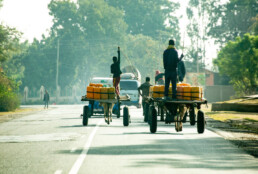
Sinek further talks about what happens when enough people believe in what we believe causing what he calls a “tipping point.” Others refer to this concept as the formation of a “critical mass” or “the point of no return” to mean the same thing – a threshold after which change is inevitable. The GERD has not only galvanized and enamored Ethiopians, but the whole of Africa. It is easy to see why the inherent drive to ensure a dignified life would resonate with Africans. The GERD is the embodiment of the spirit of “Yes we can!” It speaks to Africa’s audacity and aspiration to reclaim its dignity, destiny and future. It represents Africa’s renaissance, a step forward in the process of transforming Africa through the generation of a much-needed energy. No wonder people who have been historically treated less than human, told that they can’t, that they are not equal to the rest of the world or worthy of basic human dignity would resonate with this riveting outlook! It is because millions of fellow Africans resonate with our “why” that they stand in solidarity with Ethiopia. This is why we see a tipping point forming. As Sinek notes, when enough people believe in what you believe, a tipping point develops and tips the scales, causing the status quo to change. A
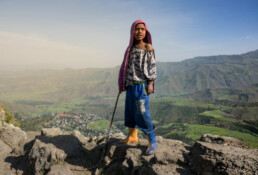
tipping point in the Nile basin has already been reached. The talk of equitable and reasonable use is more prevalent and forceful now than at any time in our history, not just at the higher levels of governance and leadership, but also at the level of everyday individuals, Ethiopians, and Africans. This is the recipe for revolutions, for radical changes, a critical mass of people driven by the same why. Change is coming!
Share
Jeff Pearce’s Brief Reflection on His Visit to Ethiopia
Month: January 2022
Jeff Pearce sat down with Horn Review to discuss his brief
trip to Ethiopia and highlight his general observation of the
situation on the ground, including recently liberated towns
in Northern Ethiopia.
I would first have to say that I have received the warmest welcome from Ethiopians everywhere I have visited. Ethiopia is a country that is quite near and dear to my heart, and I am always grateful that the people are appreciative of my advocacy. It is something that I do not take for granted. However, I am always cautious not to appear as though I am speaking for the Ethiopian People because I know that the time will come when this costly war will be over and there will be peace.
This will be a time for people like me to keep quiet so Ethiopians will have to decide how to move forward. I generally avoid passing value judgment about the intraregional politics of Ethiopia. I feel that my role is clear. For this reason, I am conscious of the proper limits of my advocacy and I take this opportunity to encourage Ethiopia’s youth to be active participants in this process; I say pick up the baton and continue to fight on because the battle is not easily won. The fight for autonomy and self-determination will undoubtedly spread to other African countries passing through similar struggles against the West, among others.
African officials and experts are often denied visas to attend international conferences. Yet, instigators, in the guise of journalists, go to war fronts and produce highly partisan propaganda. There is an embedded sense of entitlement in the west, Europe, and the UN, that Africans are having to fight off. For example, in most mainstream reporting for Ethiopia’s conflict, there is often a small reference to how “TPLF brutally administered the country” without ever relating it to the conflict or the current sentiment of the Ethiopian people towards the TPLF; which amounts to, at the very least, omission. As someone who has researched Ethiopia for nearly a decade, it is clear to me that the reports pushed out by the mainstream media lack the contextual backing and nuance that history books offer.
My visit to TPLF occupied towns has confirmed my fears about the scale and extent of the
destruction. I have had discussions with heads of espionage operations, gang members, and members of organized crime groups, and I can say that the level of brutality and sociopathic brilliance I have witnessed from TPLF victims is unmatched -but with the TPLF it looks as though their sole approach seems to be getting others killed until they get what they want.
TPLF, in its heyday, ran Afar’s entire salt mining industry through heavy exploitation of the local population. We see the same pattern in the way they administered the nation’s tourism industry from Mekelle. It is quite unfortunate that the plight of the Afar people continues in the form of overt violence today.
We are told that Ethiopia received 30 Billion dollars in aid during its stay in power, yet there is little to show for it besides the fact that children and relatives of TPLF members live lavishly in North America and Europe, and attend exclusive universities. The TPLF has plundered Ethiopia’s wealth into foreign real estate investments, and heafty international shareholdings, among other things.
It should come as no surprise that they are not willing to give power easily. Is this not why we witness piles of weapons stashed in four-star hotels here in Addis Ababa? It is important to mention the instance of Dessie to contextualize the kind of urban battle the TPLF is fighting. It was only a few weeks ago that both local and international media outlets were reporting that TPLF is close to Debre-Sina; the lesson that has to be learned is that the enemy is already here.
In my heartbreaking conversation with Dessie residents, locals told me that as soon as news of TPLFs advances were heard, local sympathizers carried out attacks against their fellow residents. I have also heard accounts of rebels rounding up locals and forcing them to loot local establishments on camera. I am not sure what end this harassment and humiliation serves, besides covering up for TPLFs destruction. Nearly every main hotel is destroyed. The same goes for hospitals; ward-after-ward of the Dessie Hospital has been looted. There is no ultrasound or any other medical equipment at the Dessie hospital,
As someone who has researched Ethiopia for nearly a decade, it is clear to me that the reports pushed out by the mainstream media lack the contextual backing and nuance that history books offer.
and the emergency room is completely out of use. This is the reality in nearly all the TPLF occupied towns I have visited. The TPLF even stole an entire Covid-lab at Wollo University, taking all the computers and hard drives. They, however, did not take the books from the university. That tells me that we are dealing with an enemy we can beat.
Because, ultimately, one does not win against terrorists with sheer gunpower; the ultimate weapon against a terrorism is education. This fact is made all the more evident in the way Ethiopia’s entire history being relitigated, and the overall narrative of this war is being debated over the twitter space. Ethiopians are deeply interconnected people and there is a great need to mend deep wounds amongst its people. Overall, I am hopeful that Ethiopia will emerge from this victorious, with a renewed spirit to rebuild better.
Share
Conversation with Dr. Tirusew Asefa - Part Two
Month: January 2022
Climate and water resources expert based in Florida
SUMMARY OF PART ONEIn part one of this interview, Dr. Tirusew discussed the core challenges facing Ethiopia, Sudan, and Egypt in arriving at a mutually beneficial agreement on the issue of the Grand Ethiopian Renaissance Dam (GERD). He explained, at length, the Sudanese perspective and their particular concerns, and recommended some confidence-building measures for the three governments, and their respective citizenry. In addition, Dr. Tirusew outlined the ever-growing challenges of climate change which, in addition to complicating the tripartite negotiations, further heightens the urgency for a durable and timely solution. Lastly, Dr. Tirusew emphasized the importance of framing the larger “water story” and weaving it into the social, economic, and political context of the three countries *.
HORN REVIEW:In your professional experience, are there any technical factors, in particular, that further complicate the negotiation process for the parties?
In my view, one of the core causes of intense debate and disagreement is assessment. Currently, Sudan, Egypt, and Ethiopia cannot agree on the baseline for assessment; for example, the measurement of water levels, threshold for drought, and other such phenomena. When weather forecasters say “today is warmer than usual” they look through 30 years of data. In our case, we would need at least 10 years and rain and precipitation data to determine the benchmarks. It is also worth considering that due to the lack of such a benchmark, Egypt has been attempting to use arbitrary figures to further pressure Ethiopia. There are various holistic assessment tools used around the world to address, among other things, the issue of equitability. How much food is produced and what is the average caloric intake of the population? What is the minimum wage everybody would require to survive? These are the questions the aforementioned tools would be answering. It is important, for any nation, to ensure that their population is, at the least, food-secure before discussing issues like water sharing. Egypt is blindly insisting on maintaining the status quo with no consideration for the assessment tools I mentioned earlier. What does this mean for Ethiopia? Ethiopia’s historically allotted amount of 0% will remain under binding conditions; Egypt does not wish to alter its historical share of 85% of Nile waters and singularly discuss the building and operation of the dam on the condition that water sharing be addressed separately-later, if at all.
HORN REVIEW:Is it possible to have conditions demanding no discussions on water sharing, yet insist on maintaining the status quo?
Exactly! It is the classic “do as I say, not as I do” command. Egyptian officials claim their share to be 50.5 BCM. I doubt the accuracy of this figure. I would guess that Egypt’s share is no less than 70 BCM. Though not directly, what Egypt is proposing entails water-sharing given that they are asking Ethiopia to release everything, i.e. all the water is stored in the reservoir. So then, what is the share of Ethiopia? Nil! Subsequently making operation conditions binding will seal the fact that Ethiopia is never to have any share of Nile waters.
HORN REVIEW:To the best of your knowledge, are there other transboundary river projects with a similar dispute between the parties?
Due to factors like climate change and population growth, water-sharing agreements need to not only be flexible but should also have built-in cooperative mechanisms. The Colorado River which runs through several US States and Mexico is administered by multiple local and international treaties. The United States and Mexico revise their agreement every decade and it is within the purview of the parties to end the agreement, provided that they give 10-year notice. Having negotiated for 10 years, the parties are only now agreeing to share water shortage in the basin amongst themselves. Juxtaposing the flexible nature of water agreements around the world with the strictly binding and one-sided conditions on Ethiopia, it is evident that Egyptian demands are not only stringent and non-reciprocal but also pose developmental challenges to Ethiopia’s growing population. The parties must come together to determine how much water there is to go around.
In 2019, Egypt announced its ambitious plans to construct 20 new cities, with large green spaces and indoor greenery, to accommodate around 30 million people. Setting aside the feasibility questions of creating new cities in the desert, this alone necessitates the need for a mutually binding agreement, i.e. amongst all parties. Luckily, there is a growing number of Egyptian water experts who are calling on their government for better water management, yet their government has not moved any closer to better agricultural production. It is my view that the Grand Ethiopian Renaissance Dam is simply scapegoated for all of Egypt’s water woes.
It is my view that the Grand Ethiopian Renaissance Dam is simply scapegoated for all of Egypt’s water woes.
As a personal anecdote, a few months ago, I came across an article on the issue with a very touching photo of an old Egyptian man in what seems to be an arid land that was claimed to have previously been a stream. I was touched by the photo and wondered. After a little investigative work, I found and found that there is a deeper water mismanagement issue that is being packaged as a result of activity upstream. Though the Egyptian government vows to improve its water management system by, among other things, switching to less water-intensive crops. In one instance, Egypt halted rice production, only to replace it with a golf course that is more water-intensive than rice. In addition, given that which has slashed the people’s water share resulting in scarcity: Egypt is also a powerful country which increased the chances of backlash (particularly from the Arab and Gulf States)
HORN REVIEW:Do you see any harm in non-experts discussing highly sensitive, yet technical, issues such as the Gerd project, with little knowledge of the science and process behind it? What are the dangers for political readers, and to their general audience?
It is very dangerous. Not only because there is a lack of scientific detail on the matter, but there are risks in the way casual information and scientific data are discussed on the same platform. For example, there is a marked difference in the way experts present uncertainties, as opposed to journalists or news hosts. This brings us to the deterministic VS probabilistic discussion of information. Most scientists adopt a cautious and probabilistic approach to the issue. However, there is a high risk for misinformation and antagonism in the way prominent media seem to deliver their, rather, deterministic views. There is an increased distortion, weaponization, and sensationalization of scientific data in the way Sudanese and Egyptian media approach the GERD project. Scientists and experts in the field of hydrology, water, and climate sciences seldom present their findings so deterministically. In addition to knowing the science behind their assertions, it is also important to accurately deliver the information.
There is an increased distortion,weaponization, and sensationalization of scientific data in the way Sudanese and Egyptian media approach the GERD project
HORN REVIEW:Given Ethiopia’s immense hydroelectric potential, and the country’s plans to lean into this potential, how can university departments, young professionals, government institutions be better custodians of our water resource?
As an educator, I will have to start with recommending an inward reorientation of our education system. For example, Ethiopian universities should integrate Abbay and other national water resources in their coursework and school activities. From my own experience, I can tell you that our universities often use random rivers and water systems from across the world as teaching examples. Why? We should be using our resources, water or otherwise, not only to educate but also to instill a sense of responsibility for generations to come. It is my observation, without exaggeration, that I have rarely met Egyptian water experts whose academic and research focus is not exclusive to the Nile. I only know a handful of people whose Ph.D. thesis or dissertation is on a water resource outside of Egypt. Due to this fact, there is ample research, information, and nuance that is built into their education. This is a product of their investment in academia, research and development, and public awareness generation efforts.
From my own experience, I can tell you that our universities often use random rivers and water systems from across the world as teaching examples. Why?
The converse is true in Ethiopia, aside from some of the information and data availed by the government, comparatively, there is little publicly available and detailed research. This effort will have a ripple effect in advance. For example the measurement of Nile tributaries. This information is widely incomplete. Granted, this endeavor requires high financial commitments and human resources. In the past, there has been some effort to complete this data with partners like the World Bank. However, little progress has been made. This is negative not only because of the lack of information but also because it perpetuates the existing problem. For example, if students in institutions of higher learning desire to do further research, and perhaps explore new research areas, these students are discouraged from even having research questions given that there isn’t the data to answer them. As an Assistant Professor myself, students do not attempt to answer certain research topics because the research question, oftentimes, is just as good as the data.
The Government should avail data and research to researchers, experts at home and abroad. As the saying goes, you cannot manage what you cannot measure. We should build an education system that uses Ethiopia’s resources for having ample data and also encourages national and foreign academics.



